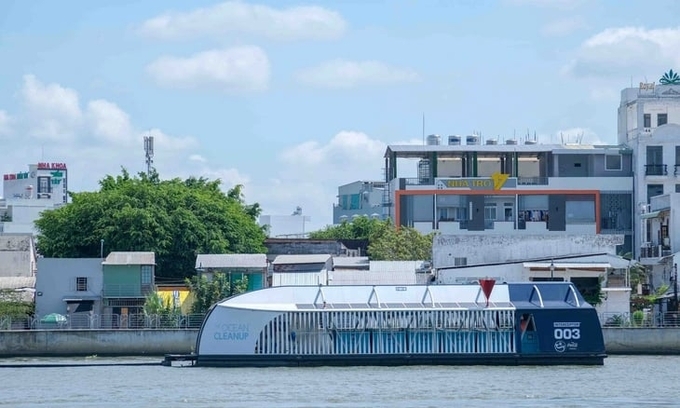May 24, 2025 | 21:15 GMT +7
May 24, 2025 | 21:15 GMT +7
Hotline: 0913.378.918
May 24, 2025 | 21:15 GMT +7
Hotline: 0913.378.918

AuAutomatic trash collection barge on Can Tho River. Photo: T.Luy.
This plastic waste collection model belongs to the non-project aid program "Pilot to improve ocean plastic waste collection using trash traps and establish a local recycling system in Can Tho", organized by Recycled Island Foundation - Clear Rivers of the Netherlands funded.
Accordingly, Clear Rivers' aid worth USD 122,000 (equivalent to VND 2.86 billion) is used to deploy passive garbage collection equipment and design a recycling program with the participation of the local community.
The project aims to find a sustainable and effective approach to plastic waste by exploring how to achieve an effective waste management system.
The method of recovering waste from rivers using trash traps and recycling with the participation of local communities is a model that is considered suitable for river urban areas, contributing to improving the plastic waste collection and management system in Can Tho.
According to a representative of the Clear Rivers organization, the waste collection system on the river includes a Litter Traps machine that operates automatically without consuming fuel, according to the mechanism of sucking floating trash on the river into bags.
Clear Rivers staff will clean the trap twice a week, and it is estimated that they will collect about 8 blocks of plastic waste. This amount of plastic waste will be reused sustainably following the circular economy model. Collected plastic waste is recycled to create furniture and construction materials...
Previously, The Ocean Cleanup also handed over to Can Tho City an automatic river trash collection barge, which was invented by this organization.
This river cleaning system is powered by solar energy, is a machine that can automatically collect trash floating on the river surface, and is being deployed to collect trash on the Can Tho River. The barge is nearly 25m long, over 8m wide, and 4m high, with a total investment of nearly VND 20 billion, of which the Dutch side sponsored VND 14.6 billion. Each month, the barge automatically collects more than 10 tons of floating garbage on the Can Tho River.
Translated by Huong Giang

(VAN) In the tranquil wetlands of Van Long, there are quiet souls who guard the forests, nurture the waters, and oversee every bird and troop of langurs as protecting the essence of a living heritage.

(VAN) WWF, GIZ, IUCN, UNDP call for biodiversity conservation and sustainable development must be regarded as a unity in strategies for a green future.

(VAN) On celebration of International Day for Biological Diversity, Deputy Minister Nguyen Quoc Tri called for practical actions to address nature and biodiversity conservation.

(VAN) Dr. Hoang Thi Thanh Nhan – Deputy Director of the Nature and Biodiversity Conservation Agency – highlighted this on the International Day for Biological Diversity, May 22, 2025.
![Ho Chi Minh city adapts to climate change: [2] Accelerating action](https://t.ex-cdn.com/nongnghiepmoitruong.vn/608w/files/chiqk/2025/05/22/4024-4220-bien-doi-khi-hau-1-100626_766.jpg)
(VAN) Clearly recognizing the challenges posed by climate change, Ho Chi Minh city has swiftly shaped its policies and implemented practical solutions to adapt.

(VAN) Rice straw is no longer just a discarded byproduct, but it is becoming a green resource that helps farmers in the Mekong Delta reduce emissions and promote circular, sustainable agriculture.

(VAN) Other Effective Area-based Conservation Measures (OECMs) are solutions that contribute effectively to achieving the goals of the Kunming–Montreal Global Biodiversity Framework.